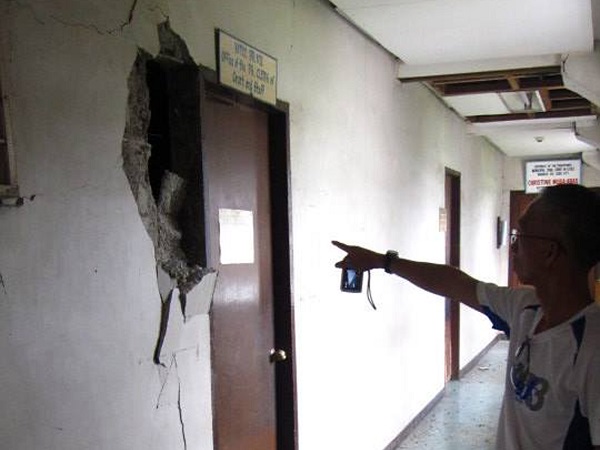
Henry Espinosa, chief security of the Palace of Justice in Cebu City, points at a huge hole and cracks on the wall in one of the Municipal Trial Court in Cities (MTCC) after the October 15 earthquake. ADOR VINCENT S. MAYOL/CDN
CEBU CITY, Philippines—The Palace of Justice, the Central Visayas regional office of the Commission on Human Rights and the “Malacañang sa Sugbu” have been cordoned off and declared off limits after structural engineers determined they had been rendered unsafe by the October 15 earthquake.
These are just three the 25 government and private structures that have been declared “unsafe” due to the extensive damage they sustained in the magnitude 7.2 earthquake that rocked Bohol, Cebu and other islands in the Visayas as well as Mindanao.
The city’s Department of Engineering and Public Works pegged the damage to property caused by the tremor at at least P300 million.
The badly damaged buildings include five government offices, four public college buildings, two barangay halls, a commercial bank, a health center, a government hospital, a city office, one private elementary school, two private high schools, and four commercial buildings.
Aside from the CHR-7, the Palace of Justice and Malacañang sa Sugbu, the other government office buildings declared unsafe were the Police National Training Institute in Barangay Apas and the Compañia Maritima, and old and abandoned building owned by the Cebu Port Authority.
Malacañang sa Sugbu was Cebu City’s old customs house which then president Gloria Macapagal-Arroyo had refurbished to serve as her official residence whenever she was in Cebu.
The barangay halls in Mambaling in the south district and Pun-ol Sibugay in the mountains had been vacated as well as the Union Bank office on Borromeo Street in downtown Cebu City.
Other structures declared “off limits” are the city-owned Cebu City Medical Center, the Cebu Normal University Teachers College Building on Osmeña Boulevard, the GMC Plaza near Plaza Independencia and the Cangha building near the Basilica del Sto. Niño, which lost its belfry during the quake.
The four others were the Water Tank area of the City Abbatoir, Cangha Builders on Legaspi Street, Antonio’s and Budget Builders on N. Bacalso Avenue, and St. Mary’s Academy High School.
Guillermo Diola, and engineer at the Department of Engineering and Public Works, said these buildings would be cordoned off until they are retrofitted.
The owners “will have to hire their own engineers to determine how they can cure the defects depending on their own structural analysis,” Viola said.
Viola, who consolidated the inspection data, said huge cracks found on the buildings indicated severe damage, making them “hazardous.”
“We posted red stickers on these structures to warn the public against their use. Building owners have to have their structures repaired if not rebuilt and certificated as safe for occupancy by their structural engineers,” Viola added, adding the safety certificates would then have to be submitted to the Office of Building Officials which will inspect the structures.
Department of Engineering and Public Works inspected 373 buildings after the earthquake. Of the number, 25 were declared “off limits” and 69 marked “restricted use.”
The rest of the buildings inspected were issued colored stickers to signify these had been inspected and declared fit for occupancy.
The department still has to inspect 838 other structures.
City Engineer Kenneth Carmelita Enriquez said her office has been flooded with requests from building owners and government officials who want to have their buildings inspected.
“But we cannot do it all at the same time because of our manpower limitations,” she said, explaining the engineers gave priority to buildings that appeared to have sustained the most serious damage.